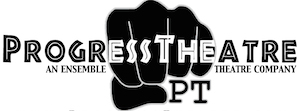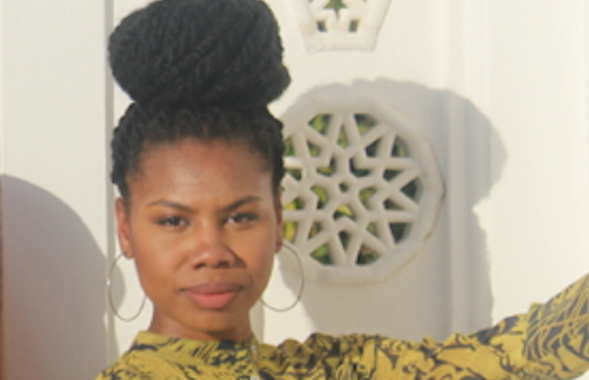For each tour city where Progress Theatre travels to perform, one of our ensemble members uses this blog to reflect on new insights, discoveries, questions and conversations we encounter as we engage with audiences and communities across the country. We share this “Ensemble Blog” as another way of following the tour, continuing the post-show dialogues often started with our audiences, and mapping our journeys “in progress”–literally and figuratively.
In The Burnin’, my contemporary character, Boo, finds herself in an abusive relationship where she thought love would be present but it never showed up. She asks a series of questions, starting with “What do love mean?”, in order to define love as a word and love as it exists or does not exist in her relationship. It was very interesting to see Boo’s journey each night through the audience’s eyes.
Multiple women testified after the show about bending to another person’s will to a point where you become their servant. In their request and demands of who they want you to be, you consequently end up loosing your own identity as a result of your constant strive for reciprocity. Multiple men attempted to compliment my performance by mentioning how sexy I or Boo was –which one, I’m not sure yet. Either way it made me uncomfortable, not because of the sexually connotative movement they saw me do onstage. Certainly not because I thought someone was attempting to make a pass as me. But, honestly I wasn’t exactly sure why it made me uncomfortable. So, like Boo, I began to ask myself a series of questions that led me to more thoughts; possibly an answer. I will extend some of them to you in this blog.
Question: Could this person be blinded by their own privilege?
We live in a society where male privilege exists just as much as White privilege. In The Burnin’ that male privilege is indirectly being challenged through a story where a woman realizes that not only does she deserve to love herself, but she deserves to the be loved by a man who essentially see’s her as a person, as a human being . A woman with a name, not just his “Boo.” As a society we have been desensitized to the objectification of women by media and entertainment. We don’t recognized the subliminal messages we send to ourselves with images of half naked women in beer ads, music videos, race tracks, and boxing rinks without mention of their stories, their accomplishments, or even their names. And, how about the very non-subliminal messages of hyper masculinity that are reinforced by men who define manhood by promiscuity, describe a cluster of women (who’s names they do not know) as “hoes”, or proudly proclaim the title of pimp or player. Telling me I (or Boo) was sexy on stage as if it were a compliment while I’m am portraying a physically, sexually, and emotionally abused woman, brings me to these next two questions…
Question: Who do you have love for in this moment? Are you only concerned with what is visually and sexually pleasing to you at the expense of someone else’s physical, sexual, and emotional health?
I recently watched a documentary that investigated and analyzed sexually abused women who had been sold as a product, service, or “goods”, as well as the consumers of these “goods”. I had a mountain of questions that were answered for me in the process of watching this program. How did these women end up here? Many were tricked, kidnapped, or felt that no other avenue of life would be achieve-able. Why didn’t they just leave? Some of them escaped and others stayed mostly because of fear. The question that I wanted answered the most was: Who would not only condone such an activity but support it monetarily by partaking in the selling and buying of these “goods? Well, people who are only concerned with what is visually and sexually pleasing to them at the expense of someone else’s physical, sexual, and emotional health. Now, I’m not saying that the audience members who told me that I (or Boo) was sexy on stage are contributing to the human trafficking industry, but on a larger scale I wonder…
Question: Are they bystanders in a war of hyper masculinity? By only noticing what they deem as “sexy”, are they enacting the power of privilege by ignoring the trauma that this character has suffered?
I do believe that these audience members genuinely mean to congratulate me on a great show and may not have the intension of offending me or enacting this male privilege, however…
Question: If someone doesn’t have the intention of being racist, is their racist comment excused?
As artists we only have control over the call that we extend to the audience through our work. We have no control over the response that is given; and even in my understanding of this, I extend the question…
Question: Once you realize that a person has been abused in exchange for their sexuality can you still see them as “sexy”? To those of us who believe that sexuality is power, more power to you. To each his own. But when that sexuality is used as currency in exchange for what one might believe is love but is in fact abuse, how can it then be powerful?
I don’t ask these questions out of condemnation, but out of love for my fellow human beings. If there’s one thing that I’m sure about, it is that love is powerful. It can conquer all privilege and injustices, but it must be a certain type of love.
As a teaching artist, I encounter a number of teenagers who stand in Boo’s shoes everyday. I can recall one particular discussion amongst my students where the question was raised, “Can you disrespect someone who you love?” As loaded as that question can be, the student gave the answer “Yes.” He used an example of a situation that is a lot like Boo’s. “That man may beat his woman, but that don’t mean he don’t love her,” he said. My coworkers then went forward to explain the very revelation that Boo has as the end of the show, which is that, “Love is more than a feeling, it is an action.” So that man must show that woman that he loves her through action.
When Boo asks the question, “What do love mean?” in hopes of reclaiming her identity, she proclaims true love for herself and her future partner, but love for the world as well. This love is the understanding of the world as greater than oneself. It’s greater than the our own selfish needs, wants, and privileges, but is in service to the well being of others. This love is not, “I love you because you are my friend”,”I love you because your my child or parent,” not even, “I love you because you love me”. This love is not sentimental or conditional but is, “I love you because you exist.”
Again this blog is simply a series of questions (possibly answers) that I’ve posed to you to think about. So in the tradition of call and response I leave you with this final question:
Are you operating on a level of love that is in the service of others rather than your own interests?

